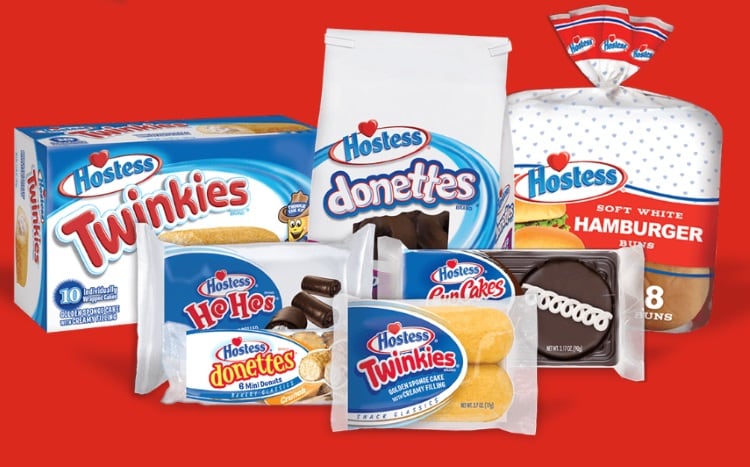Key insights:
- Smucker’s write-downs show legacy brands aren’t guaranteed growth.
- Hostess is losing ground in a health-focused snack market.
- Legal scrutiny signals tougher times for food M&A.
When JM Smucker Company shelled out $5.5 billion for Hostess Brands back in November 2023, it was meant to be a bold leap into the snack aisle of the future.
Twinkies, Donettes, Ding Dongs – these were supposed to be the crown jewels of a strategic expansion beyond jam and peanut butter. The company talked a big game about synergy, scale and shelf power. Analysts nodded. Investors cheered.
Fast forward to mid-2025 and that deal has curdled faster than an unrefrigerated snack cake in a heatwave.
What began as a feel-good acquisition has rapidly devolved into a financial debacle that’s now caught the attention of two heavyweight law firms – Kirby McInerney and Hagens Berman – each digging into whether Smucker misled investors. Between two goodwill impairments, cratering snack sales and a stock price in freefall, it’s not just Smucker’s credibility on the line. The entire FMCG playbook for big-brand M&A is now up for questioning.
This isn’t just about a few bad quarters or an overzealous growth forecast. This is a flashing red warning light for food industry dealmakers, especially those eyeing nostalgia-fueled brands and betting big on scale in a changing consumer landscape.
The not-so-sweet aftertaste

Smucker’s Q3 2025 results were the first gut punch. The Sweet Baked Snacks segment – home to Hostess and Voortman - posted an 8% sales decline. That alone would be cause for concern. But the company then dropped a $794 million goodwill impairment and lopped another $208 million off the value of the Hostess brand trademark. It took a $268 million loss on the Voortman disposal.
Less than three months later, Q4 results made that look almost rosy. Sales for the segment dropped again – this time a staggering 14%. Another $867 million in goodwill impairment. Another $113 million knocked off the Hostess name. By now, roughly 38% of the total acquisition price had been vaporized.
Smucker didn’t sugarcoat the bad news. On the earnings call, executives acknowledged their once-bright growth expectations for Hostess had dimmed considerably. In fact, they said their entire 2026 financial outlook had to be revised downward due to the “sustained underperformance” of the sweet baked goods business.
Investors responded accordingly. Smucker stock dropped more than 15% in a single day – wiping out nearly $1.8 billion in value. And that’s when the legal sharks smelled blood.
Both Kirby McInerney LLP and Hagens Berman have opened investigations into whether Smucker violated securities laws by misrepresenting the potential of the Hostess acquisition. It’s not just about performance falling short – investors and regulators alike are wondering whether Smucker knew things weren’t going as planned and delayed telling the market.
At the core is the issue of goodwill – an accounting term that often serves as a polite euphemism for optimism. Smucker had booked $2.4 billion in goodwill as part of the Hostess deal, essentially betting that future growth would justify the premium it paid. But when that optimism gets publicly dialed back in billion-dollar chunks just 15 months later? That’s the kind of red flag that makes securities lawyers salivate.
One analyst on the Q3 call put it plainly, asking if Smucker’s leadership was still “comfortable” with its broader M&A process. That’s a polite way of saying: How did this go so wrong, so fast?
Smucker-Hostess deal by the numbers
$5.5 billion: Smucker’s purchase price for Hostess Brands
$2.4 billion: Goodwill recorded at acquisition
$1.66 billion: Total goodwill impairments in Q3 and Q4 2025
$321 million: Total trademark impairments for Hostess
$268 million: Loss on sale of Voortman
15.59%: Stock drop after Q4 2025 results
$1.8 billion: Shareholder value wiped out in one day
A chilling effect for M&A
In the fast-moving world of food and beverage deals, this mess could spark a wider reckoning. Until recently, legacy snack brands with all-American roots were seen as dependable plays. Their familiarity made them easy to sell and even easier to justify on a balance sheet.
But the Hostess collapse shows just how fragile that math can be. These brands may have high awareness, but that doesn’t mean they have high velocity. Nostalgia isn’t a moat, especially when your target consumer is trading up to protein bars, low-carb options or skipping snacks altogether thanks to GLP-1s.
Going forward, expect to see a lot more diligence around actual consumption trends, not just brand recognition. Dealmakers will need to be far more cautious about baking in goodwill and activist investors may start pushing back harder on deals that feel too backward-looking.
Even more critical: companies can no longer afford to believe their own hype. Internal models built on optimistic synergy assumptions are going to face more skepticism - not just from shareholders, but now potentially from the courts.
The Smucker-Hostess blowup doesn’t just affect M&A – it may reshape the bakery and snacks category itself. The Hostess fallout makes clear what many in the industry have long suspected: sweet baked snacks are falling out of step with today’s tastes. From lunchboxes to gas station shelves, classics like Twinkies and CupCakes are losing ground as younger consumers chase protein, clean labels and something new.
Hostess, for all its beloved branding, hasn’t meaningfully reinvented itself in that regard.
And while other categories – like savory snacks or better-for-you bars – are seeing innovation and private equity interest, sweet baked goods are getting left behind. It’s a segment ripe for reinvention, but the path forward likely involves plant-based formulas, lower sugar and potentially smaller, more nimble brands – not century-old icons hoping to ride legacy status into modern households.
In that sense, Smucker’s deal might be less a one-off misfire and more of a tipping point.
A familiar fall from grace

For Hostess itself, this latest chapter is particularly brutal. It’s a brand that’s already survived two bankruptcies, a private equity gutting and a shaky IPO. It clawed its way back with slick marketing and smart distribution, but never really shed its reliance on C-stores and convenience.
The Smucker acquisition was supposed to give Hostess a new lease on life: deeper R&D, bigger retail reach and integration with other snack lines. Instead, it’s become the poster child for overvalued legacy brands in decline.
Twinkies may still tug at the heartstrings, but that nostalgia hasn’t delivered long-term growth and investors are paying the price. Whether Hostess stages another comeback or slips further into irrelevance will depend on its ability to reinvent itself for a new era.
What Smucker's mess signals for Mars and Ferrero
What’s happening at Smucker could easily ripple through the rest of the food industry.
The Mars-Kellanova and Ferrero-WK Kellogg deals are two of the biggest recent mergers in the global snacks and breakfast space. Both involve iconic brands, complex integration efforts and major expectations about synergy and growth.
In light of the Smucker-Hostess implosion, investors and analysts will be watching those deals with much sharper eyes.
For Mars and Kellanova, the pressure is now on to prove their merger is more than just a scale play. Integration of snack and cereal portfolios across international markets won’t be easy – especially if performance doesn’t ramp quickly. The risk is that what looks like synergy on a spreadsheet becomes impairment in the next earnings cycle.
For Ferrero, the WK Kellogg deal brings its own baggage. While Kellogg’s cereals have strong nostalgic power, they’ve faced steady declines in household penetration. Any stumble in post-deal performance – especially in North America – could invite similar investor backlash.
If there’s one takeaway from the Smucker-Hostess implosion, it’s that in M&A, execution matters more than ambition. Fail to deliver and that pricey goodwill becomes a red flag for investors and regulators alike.
The Smucker-Hostess unraveling isn’t just a single bad acquisition. It’s a spotlight on everything wrong with how legacy brands get valued in today’s food industry. It’s a challenge to the long-standing belief that a beloved name equals guaranteed growth. And it’s a sobering message to other food giants: nostalgia might get you a press release, but not a pass on the earnings call.
Welcome to the new M&A reality. It’s leaner, meaner and a lot less sweet.




